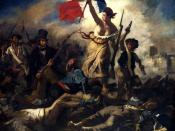Liberty for John Stuart Mill is defined as "the nature and limits of the power of which can be legitimately exercised by society over the individual". Mill argues that society can only use authority over behaviour that harms others; anything else is an end of human freedom. He links liberty to the ability to progress and to avoid social inactivity. Free discourse is a necessary condition for intellectual and social progress. The only time humans or society as a whole can interfere with individual liberty is for self-protection. Mill also notes that the right of liberty does not apply to children, or to what he calls "backward" societies. Liberty holds only when people are capable of learning from discussion; otherwise these same people must be taken care of. Mill is not justifying the claim of liberty as an abstract right; rather, he is emphasizing it with utility and for the permanent goals of mankind.
In addition, Mill states that liberty must be linked with the freedom to think as one wishes, the freedom to pursue tastes and interests and the freedom to meet with others, without all these freedoms, one cannot be considered to be truly free.
Mill starts On Liberty by arguing what kind of society can legitimately take control over the individual. He says that some humans have entered a more civilized stage of development in which issues of individual liberty must be addressed. He turns out to say that liberty used to imply protection against the tyranny of political rulers. These same rulers and its subjects were supposed to have a Slave-to-master relationship. The leader at this time did not govern for the interests of their people, and his power was also seen as dangerous. Some people then tried to limit the ruler's power by implementing political...


